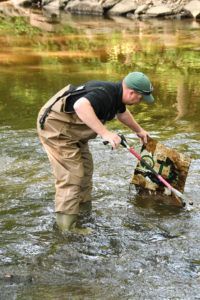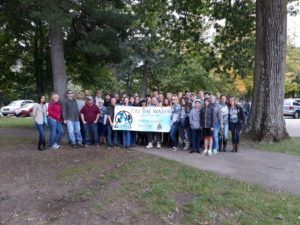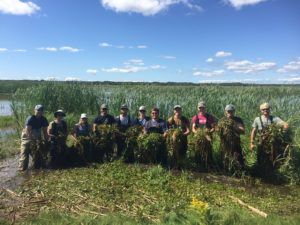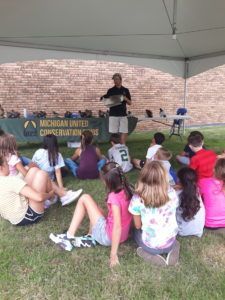OTW: Review of the 2019 field season
On the Water which is funded by Consumers Energy has only been an implemented program for four months. In that short amount of time, this program has shown that it is committed to giving volunteers opportunities to give back to their local watersheds while bringing education and awareness during the event.
committed to giving volunteers opportunities to give back to their local watersheds while bringing education and awareness during the event.
 These one-time events can teach basic skills to volunteers and about how to create and maintain habitat on their own private lands and waters and educate members of the public on wetlands, management principles. This extends the reach of our activities well beyond the project site. By arming these citizen stewards with knowledge and creating positive experiences with public lands, they are also more likely to be advocates for protecting and maintaining natural resources in Michigan for the public good.
These one-time events can teach basic skills to volunteers and about how to create and maintain habitat on their own private lands and waters and educate members of the public on wetlands, management principles. This extends the reach of our activities well beyond the project site. By arming these citizen stewards with knowledge and creating positive experiences with public lands, they are also more likely to be advocates for protecting and maintaining natural resources in Michigan for the public good.
On the Water has successfully held eight field events in Michigan. 203 individuals have participated in an OTW event which totals 756.5 volunteer hours. The bodies of water that have benefited from these events are the Red Cedar River, Manistee River, Clinton River, Lake Lansing, Flint River, Battle Creek River, Munuscong River, and Shiawassee River State Game Area.
On the Water has completed one invasive species pull where we pulled 1,400 pounds of invasive European Frogbit in a 3-hour period. One lake clean-up where we were able to pick up 150 lbs. of trash in a 3-hour span. Then we have completed six river clean ups where over 1801 lbs. of trash were picked up and disposed of properly.
On the Water also participated in one education event, The Rogue River Water Festival that was held at Cranbrook Institute of Science were we educated 93 students on the importance of habitat and Michigan waterfowl.
In just a few short months OTW has achieved so much, we are looking forward to what is in store for OTW’s field season in 2020. But we aren’t done in 2019 just yet! Stay tuned for more education events coming in the next few months.
We are looking to make connections in your community. Please contact Emma Nehan at enehan@mucc.org if you would like to coordinate a volunteer event soon! For more information and to register, please visit mucc.org/on-the-water.
The post OTW: Review of the 2019 field season appeared first on Michigan United Conservation Clubs.
Recent Posts



